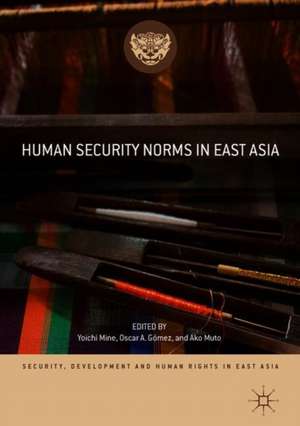Human Security Norms in East Asia: Security, Development and Human Rights in East Asia
Editat de Yoichi Mine, Oscar A. Gómez, Ako Mutoen Limba Engleză Hardback – 17 dec 2018
Preț: 737.43 lei
Preț vechi: 899.30 lei
-18% Nou
Puncte Express: 1106
Preț estimativ în valută:
141.10€ • 147.74$ • 117.04£
141.10€ • 147.74$ • 117.04£
Carte tipărită la comandă
Livrare economică 10-24 aprilie
Preluare comenzi: 021 569.72.76
Specificații
ISBN-13: 9783319972466
ISBN-10: 3319972464
Pagini: 328
Ilustrații: XXIX, 324 p. 5 illus., 1 illus. in color.
Dimensiuni: 148 x 210 mm
Greutate: 0.73 kg
Ediția:1st ed. 2019
Editura: Springer International Publishing
Colecția Palgrave Macmillan
Seria Security, Development and Human Rights in East Asia
Locul publicării:Cham, Switzerland
ISBN-10: 3319972464
Pagini: 328
Ilustrații: XXIX, 324 p. 5 illus., 1 illus. in color.
Dimensiuni: 148 x 210 mm
Greutate: 0.73 kg
Ediția:1st ed. 2019
Editura: Springer International Publishing
Colecția Palgrave Macmillan
Seria Security, Development and Human Rights in East Asia
Locul publicării:Cham, Switzerland
Cuprins
1. Human Security in East Asia: Assembling a Puzzle.- 2. Human Security Problems in Cambodia: Far from Over.- 3. Human Security in Practice: The Chinese Experience.- 4. Perceptions on Human Security: An Indonesian View.- 5. An Analysis of Japanese Stakeholder Perceptions.- 6. Perceptions and Practice of Human Security in Malaysia.- 7. Human Security and Development in Myanmar: Issues and Implications.- 8. Human Security in Practice: The Philippine Experience from the Perspective of Different Stakeholders.- 9. Human Security in Singapore: Where Entitlement Feeds Insecurity.- 10. Human Security in Practice: The Case of South Korea.- 11. Human Security in Practice in Thailand.- 12. The Concept of Human Security in Vietnam.- 13. What Is at Stake in Localizing Human Security Norms in the ASEAN+3?: A Comparative Analysis of 11 Qualitative Regional Review Surveys.- 14. The Way Forward:The Power of Diversity.
Notă biografică
Yoichi Mine is Professor in the Graduate School of Global Studies at Doshisha University, Japan.
Oscar A. Gómez is Research Fellow at the Japan International Cooperation Agency Research Institute (JICA-RI), Japan.
Ako Muto is Senior Research Fellow at the Japan International Cooperation Agency Research Institute (JICA-RI), Japan.
Textul de pe ultima copertă
The idea of human security, one of the human-centric norms born in the United Nation, has been criticized, embraced, and dynamically transformed in nations of East Asia (ASEAN Plus Three), where people are exposed to serious insecurities such as natural disasters, pollution, epidemics, armed conflicts and possible economic downturns. While there is a kaleidoscopic diversity of human security actors and aspirations, East Asians tend to think that human security and national sovereignty are compatible, and attach particular weight to freedom to live in dignity, one of the core values of human security. Elements of human security are already entrenched in the East Asian reality. This book ponders what, then, should be done next in this world of global connectivity.
Yoichi Mine is Professor in the Graduate School of Global Studies at Doshisha University, Japan.
Oscar A. Gómez is Research Fellow at the Japan International Cooperation Agency Research Institute (JICA-RI), Japan.
Ako Muto is Senior Research Fellow at the Japan International Cooperation Agency Research Institute (JICA-RI), Japan.
Caracteristici
Provides a comprehensive map of the human security challenges faced by countries in the East Asian region Analyzes responses from more than one hundred interviews of politicians, activists, scholars, business people, and journalists Advances research on norm dynamics developed in the past two decades on international organizations










